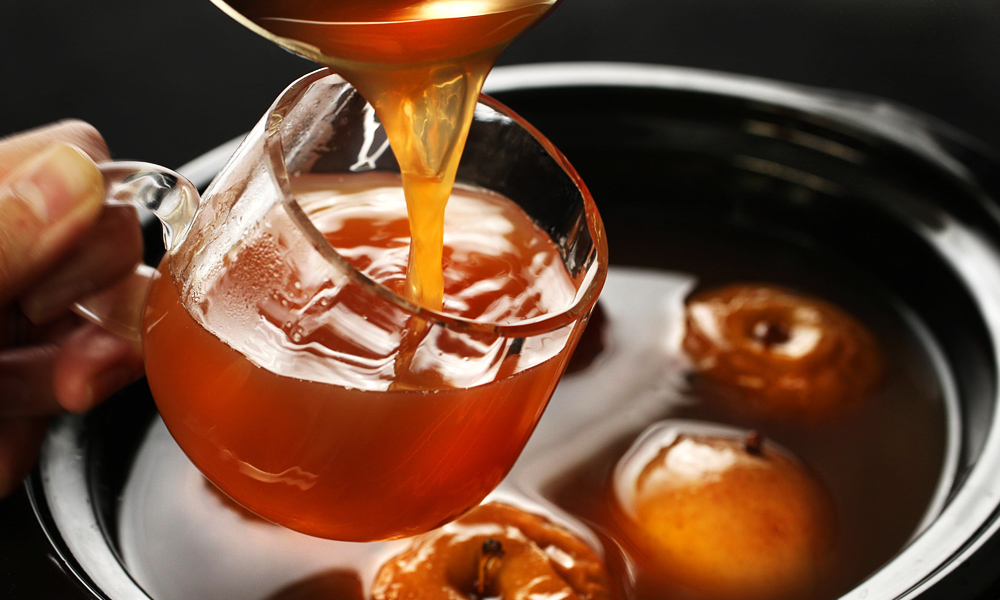For those of us in colder climates, this time of year is the hot cocktail’s time to shine. It’s the perfect drink. The warmth gets you through the chill and the alcohol keeps you feeling loose, and that’s just on the surface. When it comes to making the drink, heating it up means you can extract a ton of flavor from whatever juice, spirit, spice, or fruit you’re using. Plus, you can make the cocktail in a Crock-Pot, meaning the delicious drink your partygoers are going to love took as much effort as an easy chili.
Of all the hot and mulled cocktails, wassail is the one with the deepest connection to Christmas. For centuries, people have been drinking some iteration of this drink, and while traditional wassail is fairly limited in scope these days, we think it deserves to come back into the holiday spotlight. The history of the drink is wildly interesting, and it would be a huge shame to let something as steeped in culture as this fade away.
Almost Ancient Beginnings
The first provable appearance of wassail comes from Beowulf, the 8th century epic poem in which the Danes are terrorized by Angelina Jolie’s CGI boobs. In the Project Gutenberg copy, wassail comes up a few times, mostly as hyphenations on buildings and furniture. Wassail-halls and wassailing-benches are the two main types, so at this point, the word hasn’t quite come to specify a drink yet.
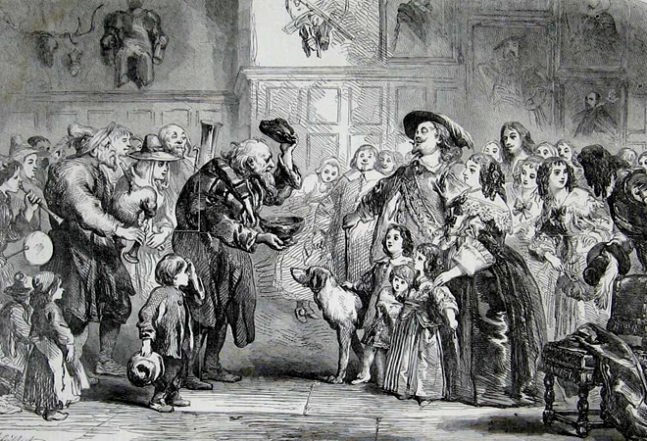
There are rumours about earlier instances though. Three hundred years earlier, in the 5th century, Rowena, a pagan princess, ignited the desire of Vortigern with the simple toast, “Lord king, wassail.” She’s also not held in particularly favorable regard in British history, as she soon betrayed Vortigern at Stonehenge, where he was killed, presumably brutally.
In both examples, wassail is meant as something you say over a drink, not a word you use to describe the drink itself. Kind of like how making a toast isn’t done with crispy pieces of heated bread. Everyone understands it’s a figure of speech.
The word is also rooted in a much older version of English, from when “was hael” was a phrase used to wish someone good health. The closest translation we have now would be something along the lines of “be well,” though that has some awkward sentence construction to it. Better to pretend it’s another language than try to directly translate it.
It’s Finally a Drink
When medieval times rolled around in Britain (the actual medieval period, not the exhilarating period piece enthralling audiences of all ages), wassail got much closer to what we know today. The tradition surrounding it evolved from a simple toast to a much larger celebration. As the story goes, tenants and servants would gather at their employer’s house during the holidays for their annual party, where they get to eat, drink, and party on their employer’s dime. During the party, the host would hold up a steaming bowl of punch and, harkening back to Rowena’s toast, shout “Wassail!” The partiers would respond, as Vortigern did, with “Drink hail!”

That’s the first instance of wassail being used as a verb and a specific drink. Guests now had something they could point to as an example of wassail in addition to the activity it used to generally refer to. In fact, the communal bowl quickly became a sticking point for the tradition. From the manor parties on, wassail included a big, alcoholic bowl of punch.
Roving Bands of Drunken Carolers
Around the same time landlords are celebrating with their tenants and large bowls of punch, unruly mobs of sloppy peasants roamed the land, carrying wassail bowls, seeking out the homes of the wealthy, and demanding Christmas goodies. You’ve heard the line, “Now give us a figgy pudding. We won’t go until we get some.” That used to be literal, not a cute line you record your nephew singing in his Christmas concert. These crowds would gather outside the estates of lords and ladies and wouldn’t disperse until they were placated with treats.
To be honest, that’s the part of the tradition we miss the most. Imagine you and your drunk friends could wander your city, town, or neighborhood, drinking in public, demanding (and receiving) delicacies from everyone making seven figures and above. For one, it reminds rich people we could totally take them if we needed to. For another, it guarantees everyone gets something delicious for Christmas, rather than the less fortunate of us celebrating with whatever they could scrounge together.

This rougher version of Christmas carried through to the 19th century. Wealthy residents of England and America both recount stories of less-than-pleased wassailers vandalizing shopfronts, accosting families, and demanding more than might otherwise reasonably expect. Shopkeeper John Birge of Deerfield, Massachusetts, recalled wassailers in 1794 breaking into his establishment and carrying away food and clothing.
Back a little further, in 1679, four young men very much overstayed their welcome with John Rowden and his wife, who were both known for their perry, a cider/wine made from pears. When they didn’t get any, they tried to counterfeit money, quite poorly at that. After that failed, they threw things at Rowden’s house and adopted son for half an hour, then wrecked poles, fences, stone walls, and stole six pecks, roughly a bushel and a half, of apples.
As with most fun traditions, a few rabble rousers ruined the thing for the rest of us.
Wassailing Mellows Out
Because a destructive and maligned tradition, like what wassailing was quickly becoming, couldn’t sustain itself, it had to be changed. Though we just told you two stories about North American settlers and early American citizens raising hell right before Christmas, what’s closer to the truth is wassailing’s more volatile aspects didn’t completely survive the Atlantic voyage. Before long, it became something much closer to what we’d recognize as caroling. Groups of people would travel house to house, sing a few songs, and offer some wassail from their bowl. This tradition had some legs, though by the 20th century, drinking had just about left it.
Beside caroling, the other path was a simple cocktail party. Close friends or family would gather during the holiday season and a bowl of wassail would be served. Drinking survived in this part, but if there were problems, they generally didn’t involve assaulting unsuspecting members of the public.
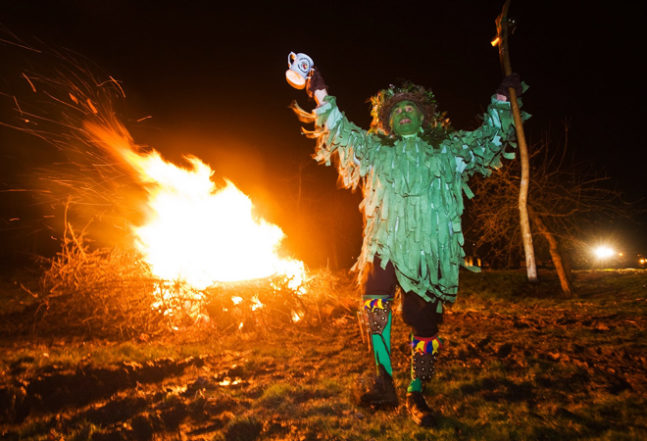
As you can probably already guess, in living memory, only elements of wassailing remain. Some communities still have mobile groups of singers, while New Yorkers of the 1930s and ‘40s remember children purposefully making themselves look dirty and stereotypically poor, and then going door to door asking for pennies. You might even make holiday punch without calling it wassail. The only place you’ll find something solidly reminiscent of the old ways is in rural English towns or farms.
Receipes For Your Wassail This Christmas
If the stories are to be believed, wassail has existed for upwards of 1600 years. That means there’s a ton of freedom inside the recipe, since nothing survives unchanged across two continents for a millenium and a half. From what we can tell, there are only two mainstays for wassail. A giant bowl and apples. Everything else is up for interpretation. But we’ll still provide you with a few choices.

Wassail (from the UK)
Why Christmas has a good recipe for something close to traditional. There’s cider, ginger, the mace you can eat (not that you spray in protesters’ eyes), nutmeg, and cloves. Those are all our favorite mulling spices, excluding mace, because we just found out what that was too. Plus, you drop a few lemons and some sugar in the bowl, because what’s mulling without citrus and sweetness? Recipe
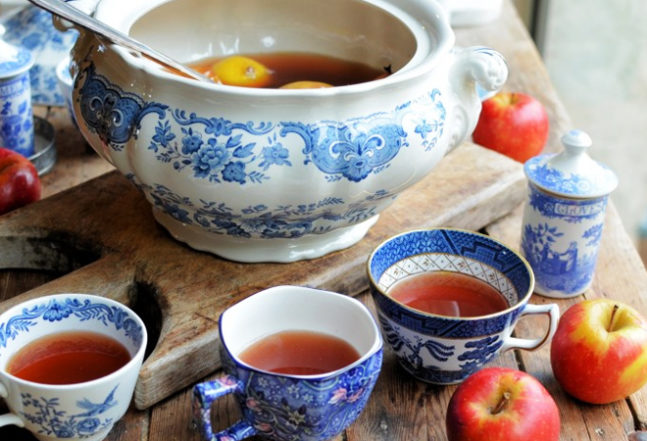
A Traditional English Wassail Recipe
This one stuck out to us for its inclusion of red wine, which just feels right. None of the sources we read said Madiera was mandatory, but it brings out a color that fits the season perfectly. Other than that, it has everything that came up as what passes for mandatory. Cider, apples, nutmeg, sugar, and lemons all show up here, with a healthy serving of port poured on top. Of the recipes we’ve read, this is the one that seems most likely to incite those belligerent Christmas riots people used to have. Recipe

Traditional Wassail
This is definitely the easiest one, if you’re concerned with prep time. You just chuck a bunch of stuff in a big pot and boil it. The most complicated it gets is cutting up oranges and floating them on top. That might seem lazy, but we’ll defend it by saying, if you think you need complications and multipage recipes to make a drink colonists used to drink while they beat up adoptees, you’re kind of missing the point. Recipe
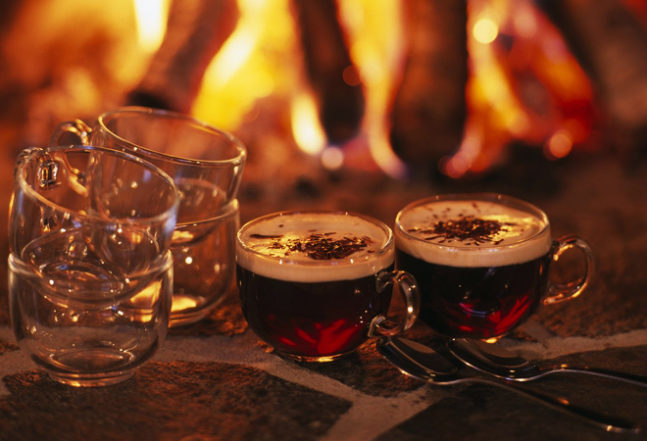
Two Recipes for the Favorite Christmas Drink
The Spruce has two recipes on the same page, and both seem delicious. They also seem like they’re throwing stuff at the wall to see what sticks, and we love it. One is a little brandy and a ton of dry sherry, while the other dumps a nearly insane amount of rum and beer into the bowl. Either one is enough to convince us to come to your party. All we need is an invitation. Recipes

